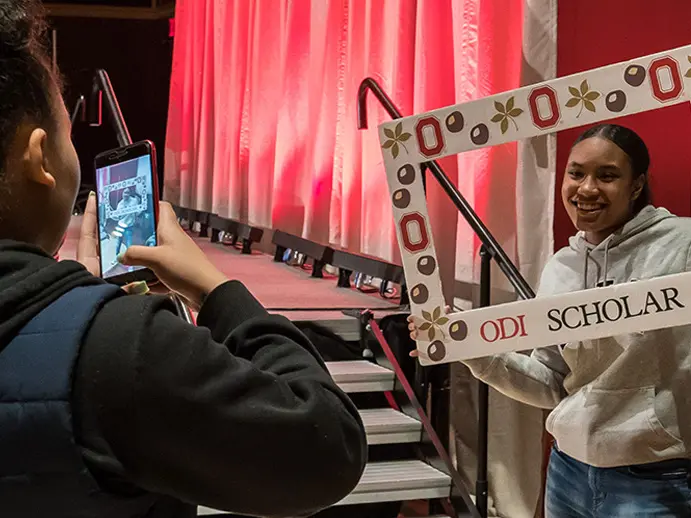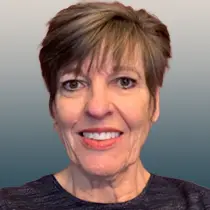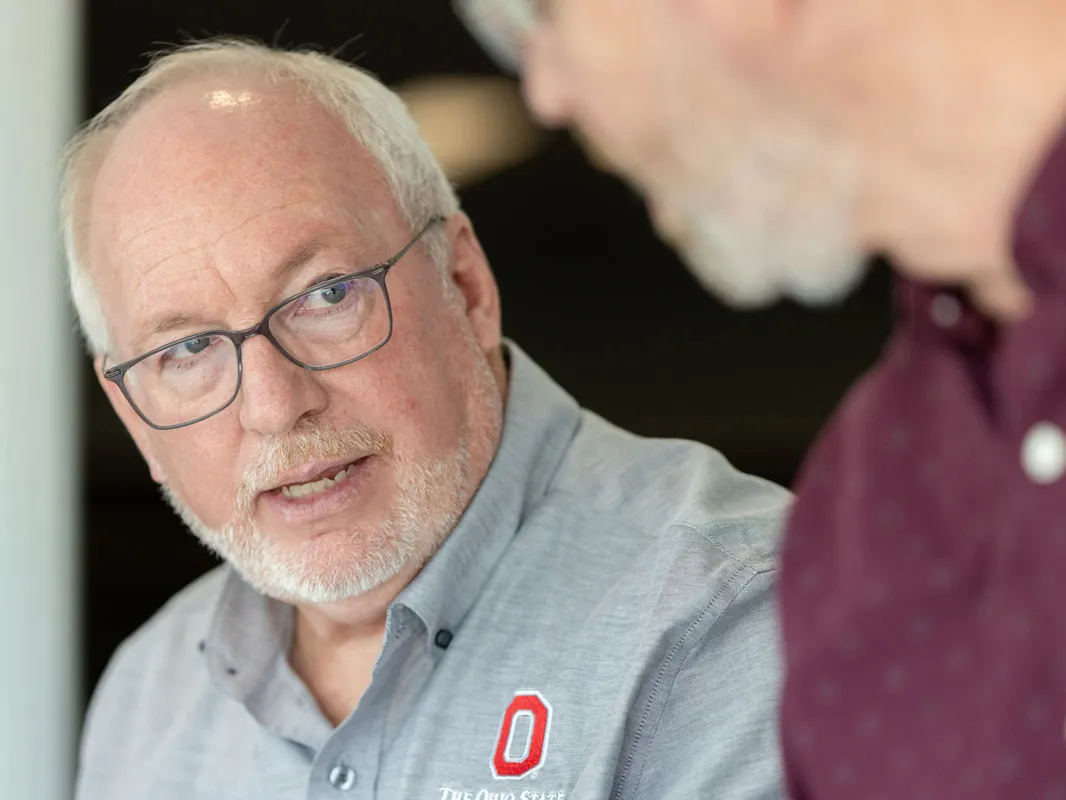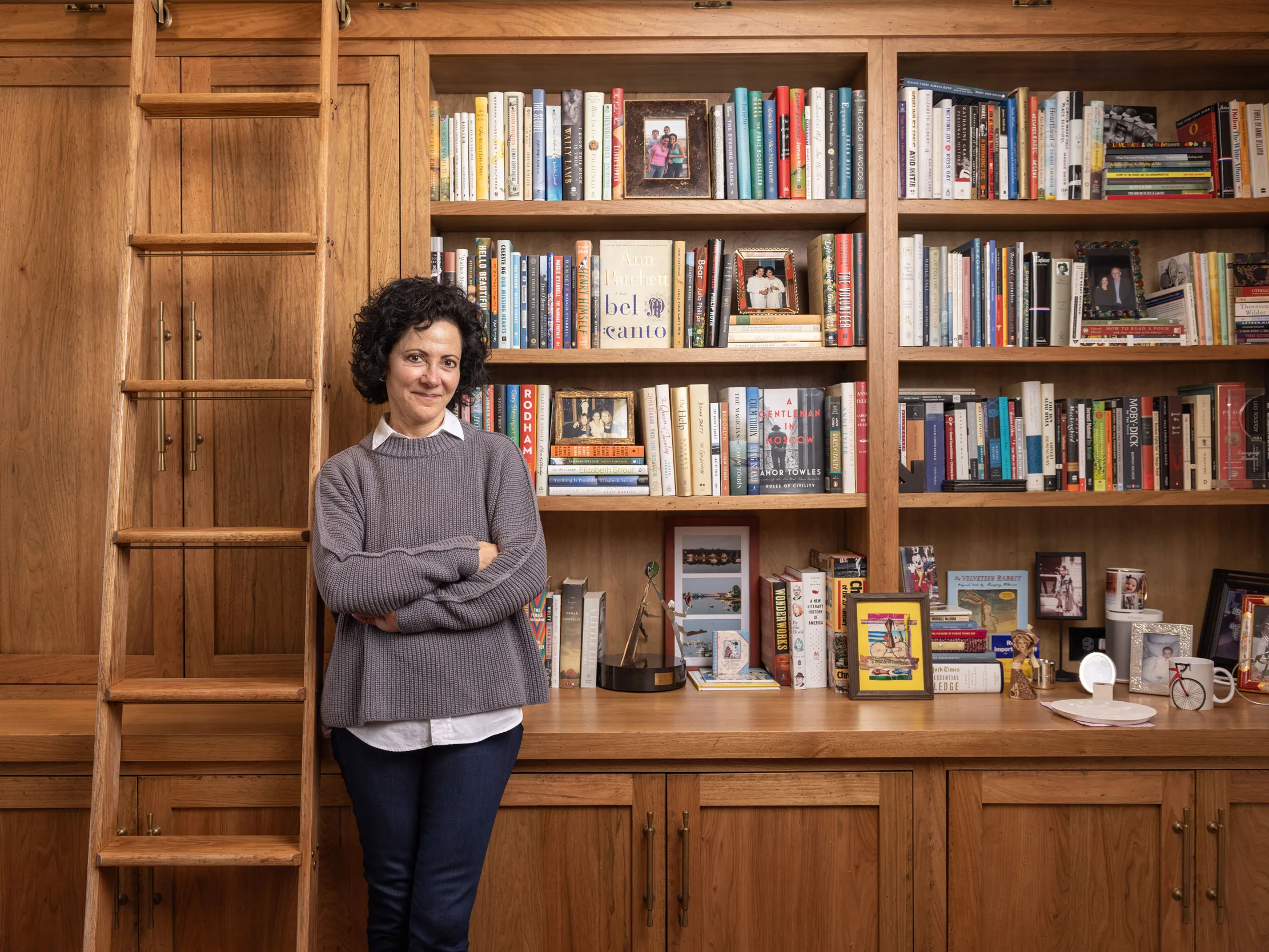
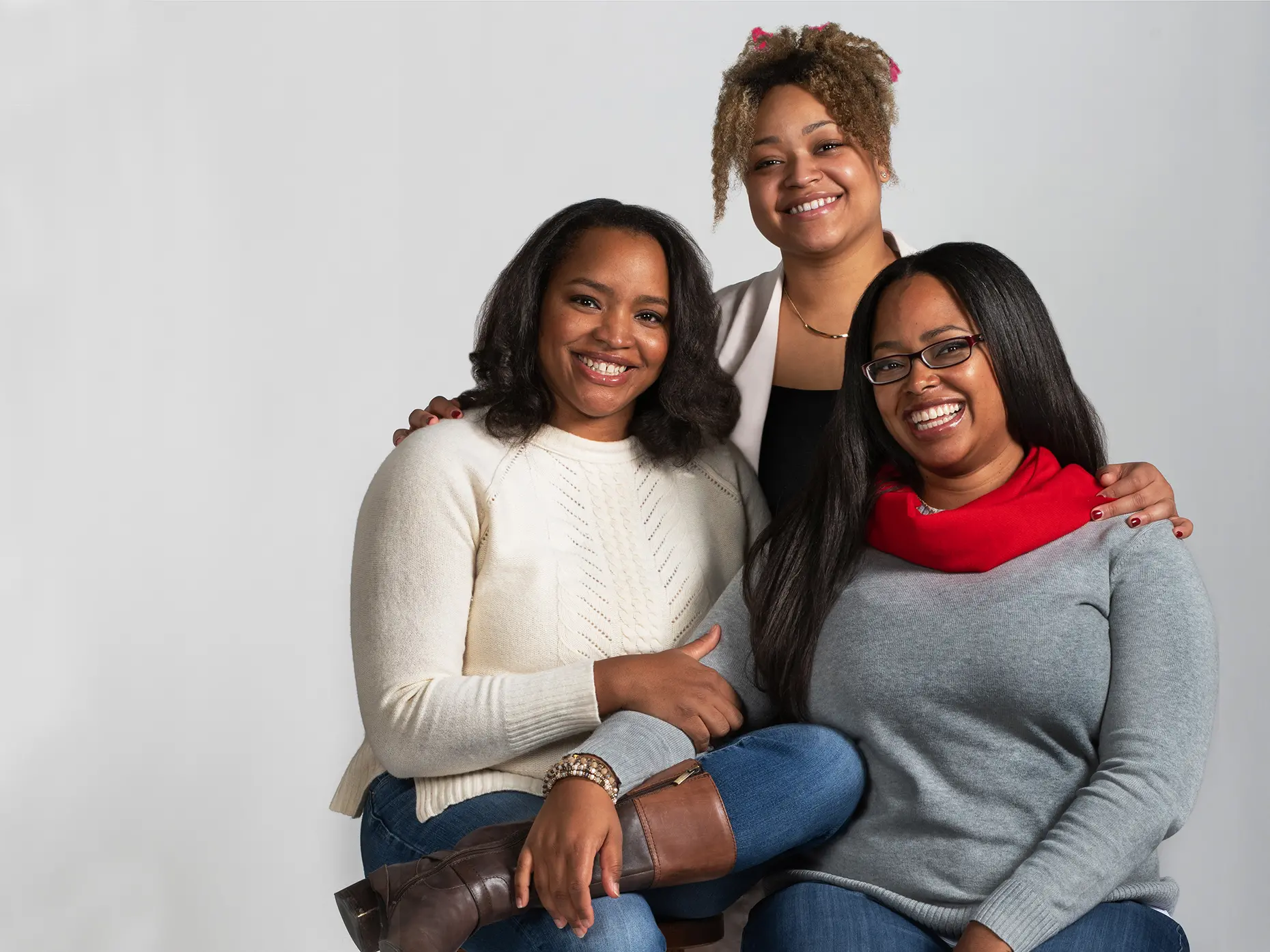
Together, they possess 9 degrees of dedication
Raised to always believe they would graduate from college, sisters Sophia, Sylvia and Starling Tolliver responded by exceeding expectations. Along with their Ohio State diplomas, they have abundant appreciation for the Young Scholars Program and a steadfast commitment to their communities.
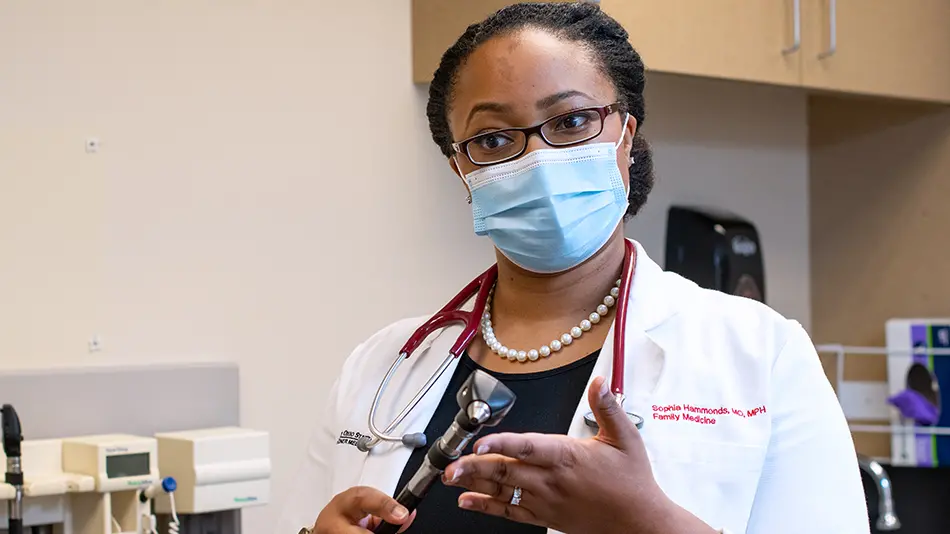
As a doctor of family medicine at Wexner Medical Center’s Outpatient Care East, Sophia is committed to serving patients with underlying health conditions and encouraging trust in COVID-19 vaccines. (Photo by Jo McCulty)
The three sisters attended David Hill Elementary and Roswell Kent Middle School, where most students qualified for free or reduced-price lunches. Because their mother worked early each day, Sophia and Sylvia arrived at school well before the doors opened for most students. They spent much of that time helping staff make school lunches. Before leaving for the day, they sometimes volunteered to help with the school’s canned food drive, and it wasn’t unusual for a teacher to drop by the Tolliver home with canned goods for their family.
“We knew what it was like to go to bed hungry,” Sophia says. “We knew what it was like to have the threat of your lights being cut off or maybe being evicted. But we also experienced tremendous support from our teachers and others in the community that allowed us to stay safe and stay focused on our studies.”
Years of hard work and hopefulness, buoyed by the steadfast resolve of their mother and opportunities created by Ohio State’s Young Scholars Program (YSP), enabled the Tolliver sisters to defy their childhood skeptics.
Collectively, the sisters hold nine Ohio State degrees. Sophia earned bachelor’s degrees in nutrition and biology in 2003 and ’04, a master’s degree in public health in 2008 and a medical degree in 2015. Sylvia earned her bachelor’s in political science and African American and African studies in 2003 and both a law degree and a master’s in public policy and management in ’06. Starling earned her bachelor’s in neuroscience in 2016 and continued on for a medical degree awarded in 2020.
All about access
Sophia was in sixth grade when her school principal and guidance counselor recommended her for YSP. It was a path to the education Barbara Tolliver envisioned for her girls, and Sylvia and Starling followed their older sister’s footsteps into the program.
This Ohio State precollege initiative serves academically talented students who would be in the first generation of their family to attend college. It assists high school students in Ohio’s nine largest urban school districts who sustain exceptional academic performance in a college-preparatory curriculum, have a strong attendance record and demonstrate financial need.
None of that was a problem for the Tolliver sisters, who maintained GPAs of 3.5 to 4.0 throughout their middle and high school years. Their mother expected nothing less.
“Only A’s were allowed in our house,” Sylvia says. “Our mother made sure we showed up at school every day and that we excelled in each and every class.”
Cost was the remaining hurdle to their college educations. With scholarships from the Young Scholars Program, Sophia, Sylvia and Starling Tolliver could realize their college dreams. That access changed the trajectory of their lives.
For the two older sisters, YSP began the summer after their sixth-grade year with a two-week stay on the Columbus campus. They attended workshops, career exploration sessions and other enrichment activities. Summer programs after seventh and eighth grades emphasized the value of establishing connections and introduced them to the expectations of college course work, all designed to enhance their preparation.
Sophia was the first to ride the bus from Akron to Columbus. When she arrived at Ohio State, the doors to her world blew wide open.
“Before I came to Ohio State, my backyard was my world,” she says. “When I got off the bus, I met people from all over Ohio and from so many different circumstances — Black and Latino students from other cities and students from Appalachia … faces I had never seen before.”
Similar revelations awaited Sylvia the following summer.
“For someone who spent her first 12 years at school, the library or the backyard, this big new world filled with interesting and different people was really exciting and a little scary, all at the same time,” she says. “There was no way my perspective was not going to be changed.”
During the school year, Sophia and Sylvia continued to thrive in their high school studies. But they couldn’t wait to get back to Ohio State. Their world had expanded, and there was no going back.
“Sylvia and I came of age in YSP,” Sophia says. “We suddenly realized that our dreams of college could become a reality. We realized that there really was something bigger out there and we could be a part of it.”
The Young Scholars Program was more than a pathway to higher education for these sisters. It became a beacon of hope.
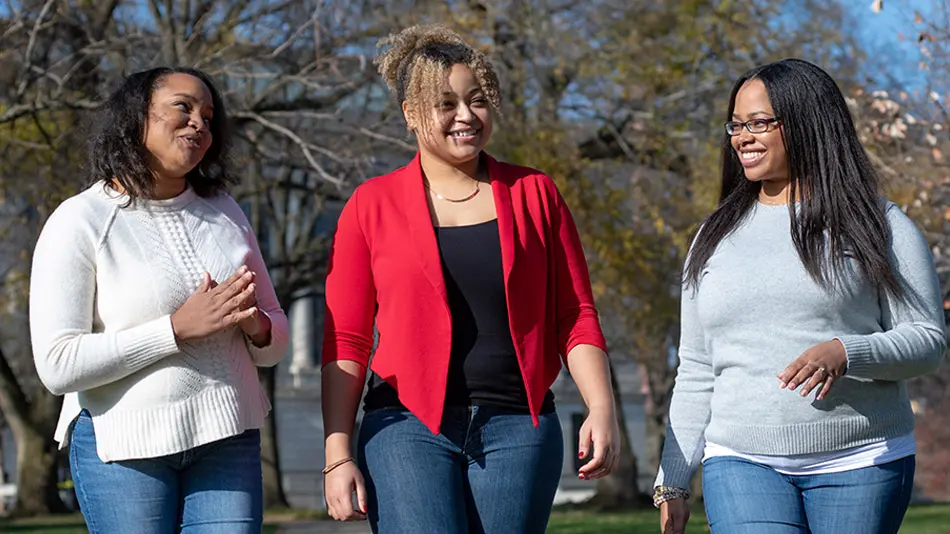
Sisters (from left) Sylvia, Starling and Sophia never applied to schools other than Ohio State, which had won their confidence through their experiences in the Young Scholars Program. (Photo by Jo McCulty)
“YSP led us to a life that transcended and eclipsed anything that we could have thought or imagined,” Sylvia says. “Those summers at YSP put us in a state of anticipation. We would go back to Akron so motivated, so excited about the possibility of changing the world, and we would make sure that we studied every day and kept up our grades so that we would get accepted to Ohio State. I don’t think any of us even applied to any other schools. Ohio State had invested in us, and we were invested in the university.”
Barbara Tolliver kept a watchful eye on her daughters, too. She had them studying at the library most days after school and, just for good measure, regularly popped into their schools unannounced to ensure her girls’ teachers and principals knew of her high expectations for them.
“If you forget for one moment that this is a very hard life, and you take your eye off the prize for even one second, you can find yourself in a situation that could have dire consequences,” Sylvia says. “Our mother never let us accept average for ourselves. She pushed us, and she believed in us. And then along came Ohio State and they said we believe in you, too … enough to help you get past any barriers to coming here to school.”
By the time Sophia and then Sylvia arrived in Columbus for their undergraduate years, they had a support system of faculty and staff mentors and fellow YSP students. They also had the confidence to tackle the academic and social structures of university life. They knew where their buildings and classrooms were and, importantly, they felt at home.
“The YSP program made our transition to college a seamless one,” Sophia explains. “It provided us a ready-made community — we felt like we belonged. We knew we would make it.”
Thirteen years Sophia’s junior, Starling Tolliver attended the YSP precollege program the summer before she began high school. Updates to the initiative’s approach meant she spent two months on campus attending college classes with Ohio State undergraduates. It was the thrill of a lifetime.
“Ohio State was where I wanted to pursue my dreams,” Starling says. “I didn’t want to look at any other schools because I knew Ohio State would provide an outstanding education. My older sisters were living proof.”
Her YSP scholarship allowed Starling to keep a laser focus on her pre-med curriculum. The only Black student in many of her neuroscience and math classes, she was determined to excel. “Coming from a community that is always thought to do poorly in school and on exams, it meant a lot to me to have had the mentors and professors I met through YSP believe in me.”
Investing in people
Ohio State’s Young Scholars Program has been making transformative investments in academically talented, first-generation students since 1988, a decade before Sophia Tolliver entered college. In turn, the program’s more than 1,000 graduates serve as role models for students who have followed and contribute in meaningful ways to their professions and communities.
Immediately after her college graduation, and before she began medical school, Starling Tolliver volunteered as a Peer Success Leader for YSP. “It was my turn to pass along the torch,” she explains.
Despite graduating cum laude with a 3.6 GPA, Starling struggled with feelings that she didn’t belong in the upper echelons of a university — the “impostor syndrome” many first-generation and minority students describe experiencing. As a peer leader, she wanted to give voice to those concerns and help younger students confront and overcome their insecurities.
“I wanted to spend the summer with the new cohort of young students to show them that a first-generation kid from poverty can be successful and that they, too, belong on a college campus.”

Starling is completing a one-year internship at the University of Rochester before heading to Detroit to complete her residency. (Photo by Bruno Chalifour)
One of Starling’s proudest achievements as a Buckeye was founding Ohio State’s chapter of the Minority Association of Pre-Medical Students to encourage and support first-generation and minority students pursuing medical degrees. She has moved on, but the fellowship of students who mentor others in their journey through med school continues.
She still volunteers to guide others — now middle school students interested in careers in medicine — as a medical intern at the University of Rochester in Upstate New York. At the end of her one-year internship, she will travel to Wayne State University in Detroit to complete her residency. She hopes to become a dermatologist to help African American women with skin concerns specific to people of color.
Sophia is a clinical assistant professor and doctor of family medicine at The Ohio State University Wexner Medical Center’s Outpatient Care East, located in a historically Black community east of downtown Columbus. Compared to the general population, African Americans — including many patients of Outpatient Care East — are disproportionately affected by diabetes, heart disease and stroke. Sophia could have chosen another hospital in another location, but she knows in her heart this is where she belongs.
“I see my own family in my patients,” she says. “I believe that a patient’s health closely mirrors the health of the surrounding community, which is why I am so passionate about providing quality health care, chronic disease prevention and education for underserved and uninsured populations.”
As a medical student, Sophia designed a nutrition intervention program to provide vulnerable Columbus residents with coaching on healthy eating and physical activity. Recently, she was lead author of a study in the Journal of the American Board of Family Medicine identifying barriers to exercise as a meaningful and regular habit for African American women. Her research highlights the need to incorporate cultural competency into medical curricula to improve doctor-patient relationships and ultimately long-term health outcomes.
Favorable outcomes also are the aim of her work to educate and engage minority patients on a variety of health issues, including COVID-19 and the need to be vaccinated. As has been well documented, African Americans are at much higher risk of both contracting COVID-19 and dying from the virus.
“As a Black health professional, I have a higher calling to fight for health justice and health equity,” she says. “Being visible in the community and building trust is something I do every day.”
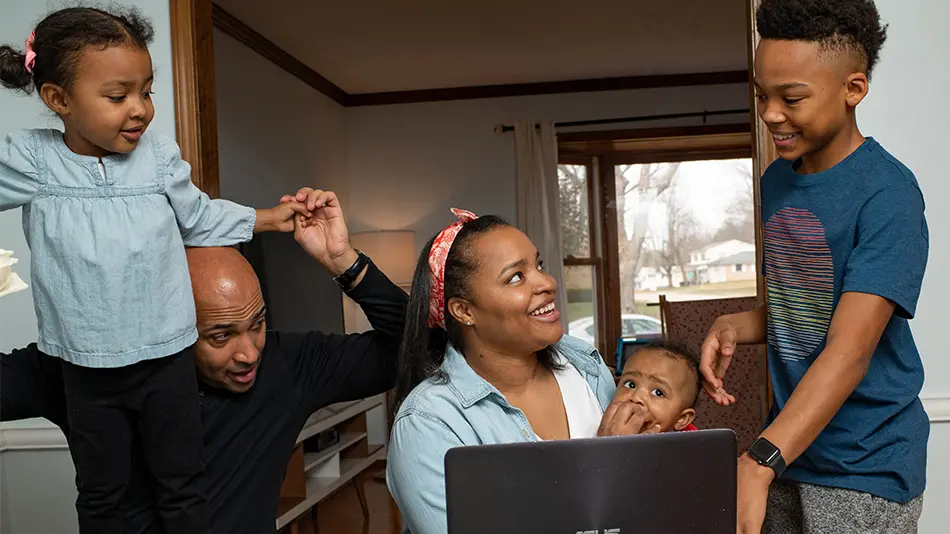
Sylvia and her husband, Gregory, plan out their spring garden with children (from left) Natalya, Ava and Marcus. A lawyer, Sylvia is currently focusing on family and an entrepreneurial project. (Photo by Jo McCulty)
Fighting injustice has been on Sylvia Tolliver’s mind for a very long time. As a little girl, she noticed that many people who looked like her did not have access to safe housing, outstanding schools or even food reliably on the table. Sylvia decided that when she got older, she was going to do something about all that.
In law school, she worked for the U.S. Attorney’s Office for the Southern District of Ohio and earned a master’s degree in public policy from Ohio State’s John Glenn College of Public Affairs. At the same time, she worked 20 hours a week at the university’s Hale Black Cultural Center, all the while developing the leadership skills necessary to handle complex issues and make real and lasting changes in the law.
Immediately out of law school, Sylvia went to work at the Ohio Secretary of State’s Office. In short order, she was handpicked by the Governor’s Office to focus on legal issues and legislative policy.
“It was one of the best jobs I’ve ever had,” she says. “By being a voice at the table, I really felt like I was having input on areas of policy that so impact people of color.”
Sylvia continued practicing law at the Ohio Supreme Court and with Vorys firm and assisted lawyers through the State Bar Association until she transitioned home to raise her three young children. She’s taken a respite from the formal practice of law, but not the commitment to make her work meaningful.
“I needed to identify a different way of contributing to the world that would bring me a sense of meaning and purpose,” she says. “I haven’t forgotten my goal — to be a light bearer, a game changer.”
Of late, she has channeled that desire to the role of entrepreneur. For the past few years, Sylvia has been working on a new product design — a labor of love, she calls it. The almost four-year journey has led from concept to preparation for launch. Collaborating with Noel Mayo, an Ohio State professor emeritus of design and owner and president of one of the few African American-led industrial design firms in the United States, Sylvia is working to secure a patent on her product this year.
Generations of promise
For Sophia, Sylvia and Starling Tolliver, poverty was a backdrop, a childhood reality. But their children, grandchildren, nieces and nephews can envision something very different.
“The opportunity afforded by the YSP scholarships has been a way for us to move our family forward — not just ourselves but all of the generations to come,” Sophia says. “One day, they can say, ‘Grandma Sophia, she’s a doctor!’ and ‘Aunt Starling, she’s a doctor!’ and ‘Aunt Sylvia, she’s a lawyer!’”
These sisters’ experiences as Buckeyes and students in the Young Scholars Program added a layer of opportunity to their own steadfast commitment to education and their mother’s unrelenting belief in them. Today it’s part of who they are and what they reflect and contribute in the world.
“We represent everything that this university embodies,” Sylvia says, “and we can’t give it away enough!”
